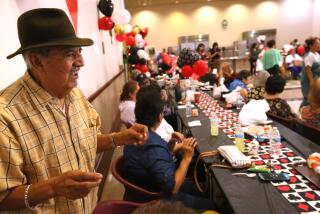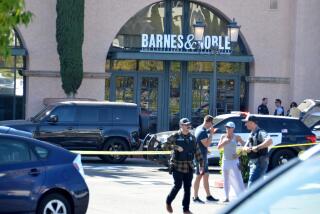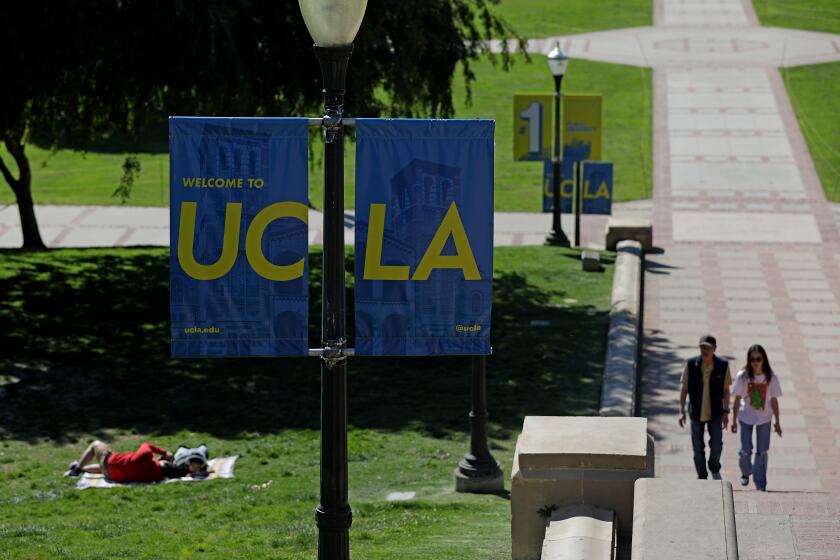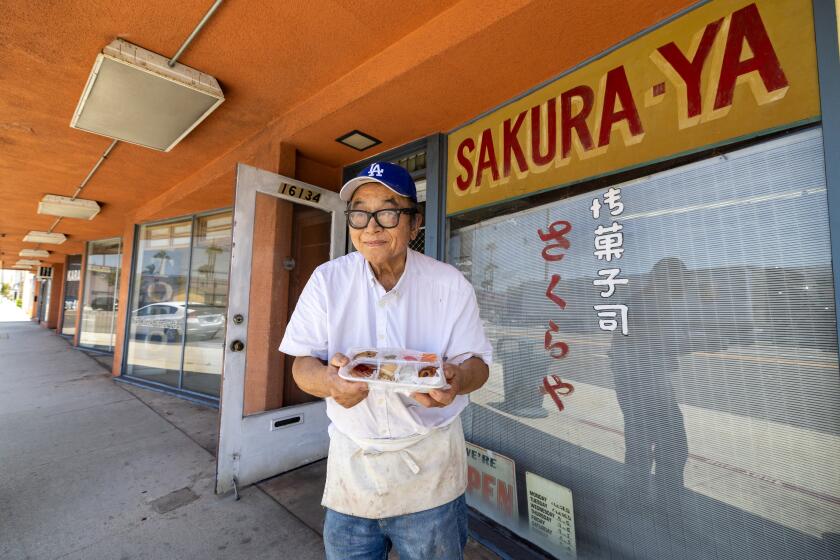Battle Lines : Use of Hughes Poem on Gay History Poster Ignites Furor
Why should it be my loneliness,
Why should it be my song,
Why should it be my dream
deferred
overlong?
--Langston Hughes
The tone is plaintive, not provocative. Yet when organizers of the Los Angeles Public Library’s June celebration of Lesbian and Gay History Month chose Langston Hughes’ poem “Tell Me” on a promotional poster, they ignited a furor over an icon.
Should Hughes, the late poet revered as a hero in the African-American community, be forced out of the closet?
No, says a coalition of black librarians who persuaded City Librarian Elizabeth Martinez Smith to withdraw the posters and a bibliography of homosexual works that, rightly or wrongly, includes Hughes.
Absolutely yes, say gay activists, including many library employees. Claiming Hughes as a cultural hero of their own, gays accuse the black librarian’s group and Martinez Smith of insensitivity, censorship and bigotry.
“That’s undisguised homophobia,” said Phillip Wilson, the city’s AIDS services coordinator and co-chairman of the National Black Gay and Lesbian Leadership Forum. By editing Hughes out of the Lesbian and Gay History Month program materials, Wilson said, officials demonstrated that open prejudice against gays, unlike open racism or anti-Semitism, remains the socially acceptable norm.
Martinez Smith, completing her first year as chief of the nation’s second-largest public library system, ruefully says that her intent was to avoid controversy.
The administrator, who has made Los Angeles’ cultural diversity a central theme of the library system, points out that scholarly debate over Hughes’ sexuality is by no means settled. “My role is to provide accurate information and not to espouse any one cause,” she said.
Martinez Smith said that had she not exercised her “editorial rights,” the library would instead be facing resentment from African-Americans angered by the suggestion that Hughes was homosexual.
Members of the California Librarians Black Caucus say that they based their objections not on their own attitudes regarding homosexuality, but on concerns that many African-American patrons would be disturbed by the implication that Hughes was homosexual.
One black librarian, Wanda Johnson, said that when she showed the posters to her predominantly black staff at the Mark Twain branch in South-Central Los Angeles, the reaction was instantly negative.
“Most of the librarians had not heard he was gay,” Johnson said, adding “we did not feel comfortable about trying to explain to the public why the library needs to educate people about his sexuality.”
In a letter to Martinez Smith, Joyce Sumbi, an officer in the black librarians group, said use of the Hughes quotation “would be insensitive and divisive at a time when African-Americans have set unity as major goal. . . . We have identified our own heroes, heroines and role models. . . . In no way do we intend insult to other groups in our celebrations and we ask that others show us the same courtesy.”
But insult is precisely the feeling, gays say. The action reinforced the view that homosexuality is a shameful taboo, they said. “Gays are so denigrated they can’t be heroes,” said Cosmo Bua, a clerk at the Wilshire Branch Library and founder of Gay and Lesbian United Employees (GLUE), a group that consists largely of library employees.
Many gays expressed astonishment along with outrage. Gay literary anthologies routinely include Hughes’ work. Wilson’s organization of African-American gays produced a documentary titled “We Have a Legacy” that honors Hughes and such gay black figures as writer James Baldwin and civil rights activist Bayard Rustin.
Hughes died in 1967 without acknowledging whether widely circulated rumors of his homosexuality were true. The evidence was circumstantial: he never married, he had many openly gay friends, he frequently had effeminate male companions. Moreover, many readers see gay themes in his poetry.
Within gay society, Hughes’ homosexuality was “an open secret” since the 1940s, said Jim Kepner, founder and curator of the 20-year-old International Gay and Lesbian Archives.
As with many others in that far less tolerant era, it was assumed that Hughes, often dubbed the poet laureate of black America, feared ruin if his sexual life were revealed.
Kepner, 67, suggests that the writer was quite possibly confused and ashamed of his sexual desires. It was common then, he said, for homosexuals to confine themselves to anonymous, emotionally hollow encounters rather than steady relationships. Fear of discovery prompted gays “to cover for each other,” he said.
But the late George Houston Bass, Hughes’ last private secretary and trustee of his estate, persistently combated the view that Hughes was gay. For example, before his death in October, Bass blocked the showing of the film “Looking for Langston,” a portrait of black gay sexuality, in the Los Angeles International Gay and Lesbian Film and Video Festival. It was later edited to remove passages of Hughes’ works. Martinez Smith cited the stance of Hughes’ estate as a key reason for her decision.
Biographers have taken different tacks regarding Hughes’ sexuality.
In “Langston Hughes: Before and Beyond Harlem,” published in 1983, Faith Berry flatly asserts that Hughes was homosexual--”a fact never publicly expressed”--but provides scant evidence.
Arnold Rampersad is more circumspect in his two-volume “The Life of Langston Hughes,” completed in 1988. The Princeton University scholar found that the “preponderance of opinion” among Hughes’ closest associates was that the poet was essentially asexual. Attempts at seduction were rebuffed. Yet Rampersad also reports that Hughes once confided to one of his secretaries “the first homosexual episode of his life” involving a ship’s crewman on a voyage.
“I was quite willing to reveal that Hughes was homosexual and I certainly went looking for the evidence,” Rampersad said in an interview. “But I came up with nothing. . . .
“But I’m not saying he was not gay. I’m saying the evidence isn’t there. . . . It’s a complicated business and I don’t know where people get off saying he was gay, he was gay, let’s claim him.”
Esme Bhan, research associate at Mooreland-Spingarn Research Center at Howard University, where Hughes’ personal papers are kept, agreed with Rampersad.
“The gay and lesbian historical community is trying to claim as many famous people as they can,” Bhan said. “I have seen letters from men to Hughes that are very amorous. But none from Hughes to any of these guys are amorous at all.”
Rampersad, however, said there may be validity to one of Kepner’s theories: that Hughes had suppressed homosexual longings because he was protective of his reputation and stature as a literary voice for the black community.
Gay activists say that they have been asked whether the poster represented part of a campaign to “out” Hughes. The point, Bua said, is “to establish reality, to acknowledge history.”
Bua said the discord represents a step backward in the library’s attitude toward homosexuality. He organized GLUE three years ago while his lover was dying of AIDS because the library provided little information to the public concerning the disease, he said.
Martinez Smith said her chief goal has been to make the Los Angeles library system reflect the city’s cultural diversity. Only two months ago, she said, gay staff members “were inviting me out to lunch” because they were so thrilled that she had authorized June to be Lesbian and Gay History Month. The controversy has since prompted her to establish workshops intended to smooth relations among library employees.
“We almost feel we’re being pitted one against the other,” said Sheila Weisberg, literacy coordinator at the North Hollywood Regional Library and a spokeswoman for GLUE. “We are not against the black librarians who complained about the quote. . . . I mean some of our GLUE members are black.”
Johnson, the black librarian at Mark Twain, said she understands why the protests of the poster were interpreted as homophobic. But, she suggests, a different reflex was at work--to resist racism.
Within the black community, she said, “some people have been conditioned by experience that if something is brought out that they consider to be negative, the first thing they think is that it’s just the Establishment’s way of discrediting that person. . . .
“Now,” Johnson added, “that may be evidence of homophobia. And I know we have many gay patrons, and some staff members are gay. Some are openly gay, and some are rumored to be. . . .”
Johnson let out a sigh.
“I don’t know whether it was the right thing to do or not.”
More to Read
Start your day right
Sign up for Essential California for news, features and recommendations from the L.A. Times and beyond in your inbox six days a week.
You may occasionally receive promotional content from the Los Angeles Times.






